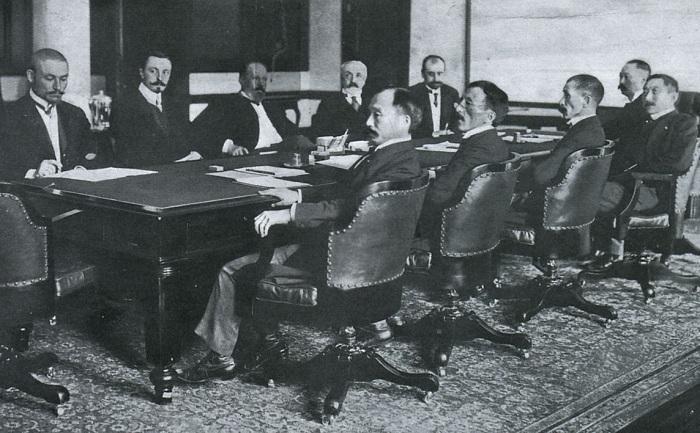The photo above was taken in 1905 and features the Treaty of Portsmouth delegations: Russians (far side of table) — Korostovetz, Nabokov, Witte, Rosen, and Plançon; and Japanese (near side of table) — Adachi, Ochiai, Komura, Takahira, and Sato.
The Treaty of Portsmouth
The Treaty of Portsmouth was the agreement that formally ended the Russo-Japanese War of 1904-05. Signed on September 5, 1905, it was the result of negotiations that took place in Portsmouth, New Hampshire, under the supervision of U.S. President Theodore Roosevelt. The conflict arose from disputes over the control of Manchuria, which both Russia and Japan claimed. Russia had entered the region during the Sino-Japanese War of 1894-95 and taken control of Port Arthur, a warm-water port with strategic and commercial significance. Japan attacked the Russian fleet at Port Arthur in 1904 and soon after declared war, resulting in a year of bloody battles in Korea and the Sea of Japan.
The Japanese government began seeking out intermediaries to assist in bringing the war to a negotiated conclusion as early as July 1904. The intermediary they approached was U.S. President Theodore Roosevelt, who had publicly expressed a pro-Japanese stance at the beginning of the war. However, as the war progressed, Roosevelt became increasingly concerned about Japan’s strengthening military power and its long-term impact on U.S. interests in Asia. In February 1905, Roosevelt sent messages to the Russian government via the U.S. ambassador in Saint Petersburg. Initially, the Russians were unresponsive, but after the Battle of Mukden, which was extremely costly to both sides in terms of manpower and resources, the Japanese government judged that it was now critical for Japan to push for a settlement.
On March 8, 1905, the Japanese Army Minister met with the American Minister to Japan to tell Roosevelt that Japan was ready to negotiate. However, a positive response did not come from Russia until after the loss of the Russian fleet at the Battle of Tsushima. On June 7, 1905, Roosevelt met with a Japanese diplomat and on June 8, he received a positive reply from Russia. Roosevelt chose Portsmouth, New Hampshire, as the site for the negotiations, primarily because the talks were to begin in August, and the cooler climate in Portsmouth would avoid subjecting the parties to the sweltering Washington summer.
The Japanese delegation to the Portsmouth Peace Conference was led by Foreign Minister Komura Jutarō, and the Russian delegation was led by former Finance Minister Sergei Witte. The negotiations took place at the General Stores Building, with a total of 12 sessions being held between August 9 and August 30. During the first eight sessions, the delegates were able to reach an agreement on eight points. These included an immediate ceasefire, recognition of Japan’s claims to Korea, and the evacuation of Russian forces from Manchuria. The remaining four sessions addressed the most difficult issues: reparations and territorial concessions.

On August 18, Roosevelt proposed that the Russians offer to divide Sakhalin to address the territory issue. On August 23, Witte proposed that the Japanese keep Sakhalin and drop their claims for reparations. When Komura rejected the proposal, Witte warned that he was instructed to cease negotiations and that the war would resume. The ultimatum came as four new Russian divisions arrived in Manchuria, and the Russian delegation made an ostentatious show of packing their bags and preparing to depart. Outmaneuvered by Witte, Komura yielded, and in exchange for the southern half of Sakhalin, the Japanese dropped their claims for reparations.
The Treaty of Portsmouth was signed on September 5, 1905. The treaty gave consent to the Japanese colonization of Korea and confirmed Japan’s emergence as the pre-eminent power in East Asia. The treaty also forced Russia to abandon its expansionist policies in East Asia, but it was not well received by the Japanese people. The lack of an indemnity was considered an affront, and there were protests and riots in Japan. The treaty was also criticized by other countries, as it did not address the issue of racial equality, and Japan’s victory over a European power raised concerns about the balance of power in the world. Nevertheless, the Treaty of Portsmouth marked the end of the Russo-Japanese War and paved the way for Japan’s rise as a major world power. It also established President Theodore Roosevelt as a key mediator in international diplomacy and earned him the Nobel Peace Prize in 1906.
The Treaty of Portsmouth was a significant event in U.S. diplomatic history. Theodore Roosevelt’s role in the negotiations cemented the United States’ status as a rising world power and a major player in international relations.
Roosevelt’s decision to act as an intermediary in the peace talks was not without controversy. Many Americans supported Japan in the conflict, but there were also concerns about the potential consequences of Japanese dominance in the region. Some American policymakers worried that a powerful and expansionist Japan could threaten U.S. interests in Asia and destabilize the balance of power in the region.
Despite these concerns, Roosevelt believed that a negotiated settlement was the best outcome for all parties involved. He recognized the value of maintaining strong diplomatic ties with both Russia and Japan, and he was determined to broker a peace agreement that preserved their respective interests in the region.
Roosevelt’s efforts paid off in the end. The Treaty of Portsmouth helped to prevent a prolonged conflict between Russia and Japan and created a period of relative peace and stability in East Asia. It also demonstrated the United States’ growing role in world affairs and its commitment to promoting peace and stability on the global stage.
However, the Treaty of Portsmouth was not without its flaws and controversies. Many Japanese citizens were dissatisfied with the terms of the agreement, which they believed did not adequately compensate Japan for its sacrifices in the war. In Russia, there were also concerns about the loss of territory and influence in the region.
The Treaty of Portsmouth also had important implications for Korea, which was effectively annexed by Japan a few years later. The treaty paved the way for Japanese colonization of Korea and helped to establish Japan as the dominant power in East Asia.
Overall, the Treaty of Portsmouth was a significant event in the history of U.S. diplomacy and international relations. Theodore Roosevelt’s role in the negotiations helped to preserve peace in East Asia and cemented the United States’ status as a major world power. However, the treaty was not without its controversies and its long-term consequences for the region are still being felt to this day.
References:
- https://dailyhistory.org/How_did_Theodore_Roosevelt_help_resolve_the_Russo-Japanese_War_with_the_Treaty_of_Portsmouth
- https://history.state.gov/milestones/1899-1913/portsmouth-treaty
- https://www.theodorerooseveltcenter.org/Learn-About-TR/TR-Encyclopedia/Foreign%20Affairs/The%20Treaty%20of%20Portsmouth
- https://en.wikipedia.org/wiki/Treaty_of_Portsmouth
- https://en.wikipedia.org/wiki/File:Treaty_of_Portsmouth.jpg
- https://theodorerooseveltcenter.org/Research/Digital-Library/Record.aspx?libID=o275158


